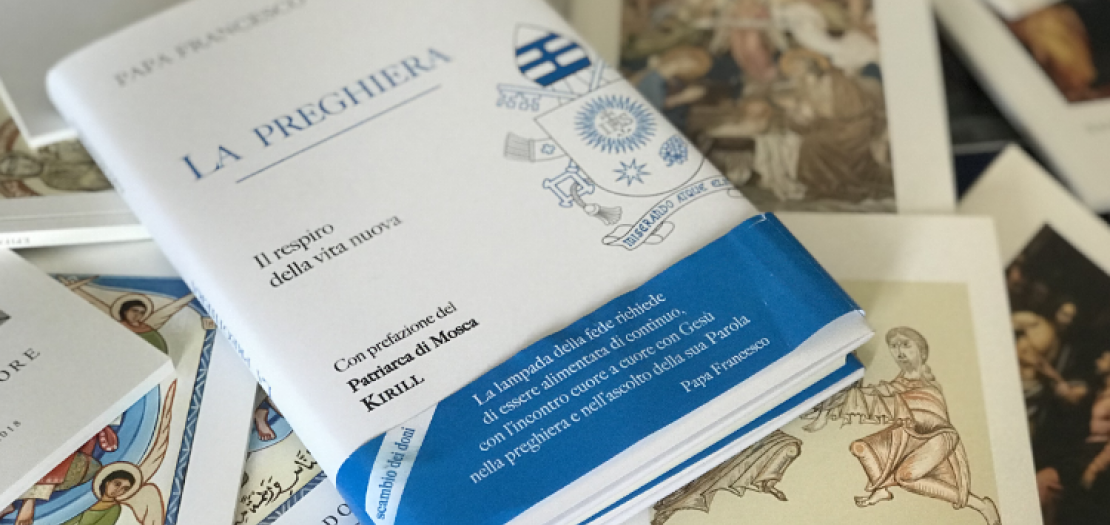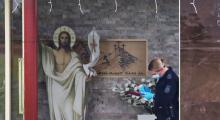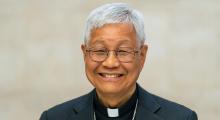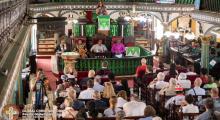Issued by the Catholic Center for Studies and Media - Jordan. Editor-in-chief Fr. Rif'at Bader - موقع أبونا abouna.org

In a previously unpublished work, Pope Francis highlights the role of prayer in the Christian life. The text is contained in a new book titled La Preghiera. Il respiro della vita nuova, (Prayer: the breath of the new life) published by the Libreria Editrice Vaticana (LEV), the Vatican publishing house; an extract appears in Avvenire, the daily paper of the Italian Bishops’ Conference. “La Preghiera” gathers together several of the Pope’s discourses on prayer, in particular his comments on the “Our Father”, and features a preface by the Orthodox Patriarch of Moscow, Kirill. The book will be released in Italy and France onOctober 24.
Following is an extract from La Preghiera. Il respiro della vita nuova:
Baptism is the beginning of new life. But what does new life mean?
The new life of baptism is not new as when we change work or move to another city, and say: I have begun a new life. Certainly in these cases life changes, perhaps a great deal. It is different from what has gone before: better or worse, more interesting or less so, according to the individual cases. The conditions, the context, the colleagues, acquaintances and perhaps even friendships, the house, the salary are different. But it is not a new life; it is the same life that goes on.
The new life of baptism also differs from a radical change in our feelings for a lover; or a disappointment; a disease; an important yet unforeseen event.
Things of that kind can befall us like an earthquake, internally and externally: they can change our values, our fundamental choices: affections, work, health, service to others. Before one might have thought of a career, and later begin to work as a volunteer; or even give one’s own life as a gift for others! Before one might not have thought of building a family; later, they might experience the beauty of conjugal and familial love.
These too, which are great, extraordinary changes, are still “only” of transformations. They are modifications that lead us to a more beautiful and dynamic life, or a more difficult and tiring one. It’s no coincidence – when we talk about them – that we always use the expressions “more” or “less”. We could say that they have made our existence more beautiful, more joyful, more exciting. It is because we are always making comparisons between things that are more or less similar. It is as if we were measuring things on a scale of values. In our earlier life, joy was a “5”, now joy is a “7”; our health before was a “9”, now it is a “4”. The numbers change, but not the substance of life!
But the new life of baptism is not new only in respect to the past, to our earlier life, to our life before. New doesn’t mean recent, it doesn’t signify that there was [only] a modification, a change.
The life of God is communion and it is given to us as a friendship
The new life of which Saint Paul speaks in his letters reminds us of the new commandment of Jesus (cf. Jn 13:34); it reminds us of the new vine of the Kingdom (cf. Mk 14:29), the new song that the saved sing before the throne of God (cf. Rv 5:9): of the definitive realities; that is, to use theological word, eschatological.
So we understand that for the new life it is not possible to make comparisons. How could you possibly compare life and death, or life before and after birth? Christ did not become one of us, He did not live His Pasch of the passion, death, and resurrection to make our life “better”, to make it more beautiful, more desirable, longer, more intense, easy, or happy. He came – as He told us – that we might have life in abundance (cf. Jn 10:10).
This is the new life, the life that God the Father presents to us in baptism. It is new because it is another life with respect to our own, because it is His life, it is the very life of God. This is the great gift that He has given us and that Jesus gives us! To participate in the love of the Father, of the Son, and of the Holy Spirit. To participate in the love that They have for all men and for all creation. The new life is the life of God given to us!
We Christians have always sought after images and symbols to express this immense gift. We are many, different, yet we are one only, we are the Church. And this unity is that of love, which does not compel, does not humiliate, does not limit us, but strengthens us, builds all of us up together, and makes us friends.
Jesus has a very beautiful expression in the Gospel: “This is eternal life, that they know you the only true God, and Him whom you have sent” (Jn 17:3). It is He Himself who tells us that true life is the encounter with God; and that the encounter with God is the knowledge of God.
We know, further, from the Bible that it is not knowing the person only with the head, because “to know” means “to love”. And this is the life that God has given to us: the love that becomes ours, and little by little makes us grow, thanks to the Holy Spirit (Rm 5:5), and enlightens even our little daily expressions, “Thank you”, “May I?”, “Sorry”.
Although the words are inadequate, it can be said that the new life is to discover oneself to pertain to Someone, to belong to Someone, and in Him to belong to all. Belonging means that each one is for the other.
This reminds me of what the bride says in the Song of Songs: “My beloved is mine and I am his” (2:16). So, day after day, the Holy Spirit is bringing to completion the prayer of Jesus to the Father: “I do not pray for these only, but also for those who believe in me through their word: that they may all be one; even as thou, Father, are in Me, and I in Thee, that they also may be in Us” (Jn 17:20-21).
One of the most ancient images – used already by Saint Paul – in order to express this belonging, this living-with – is that of the body, the Head of which is Christ, while we are the members (“Now you are the body of Christ and individually members of it” (1 Cor 12:27).
The symbol of the body
In the human body, there are some essential functions, such as breathing and the beating of the heart.
I like to imagine that the personal and communal prayer of us Christians is the breath, the heartbeat of the Church, which instills its strength in the service of those who work, study, teach; which makes fruitful the knowledge of educated people and the humility of simple people; which gives hope to the tenacity of those who fight injustice.
Prayer is our saying “yes” to the Lord, to His love that reaches us; it is welcoming the Holy Spirit Who, without ever growing weary, pours out love and live upon all.
Saint Seraphim of Sarov, a great spiritual teacher of the Russian Church, said, “Acquiring the Spirit of God is therefore the true end of our Christian life, to the point that prayer, vigils, fasting, almsgiving, and other virtuous actions done in the Name of Christ are only means for this end” [Colloquy with Motovilov]. You are not always conscious of breathing, but you can never stop breathing.
Pope Francis







